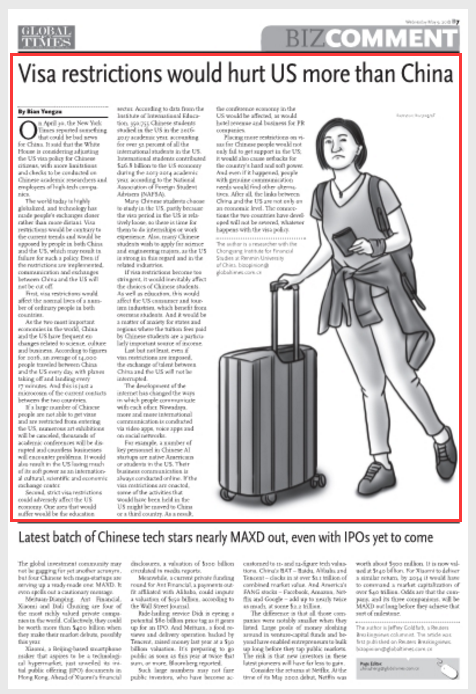Major Power Relations
Your Present Location: PROGRAMS> Major Power RelationsBian Yongzu: Visa restrictions would hurt US more than China
By Bian Yongzu Source: Global Times Published: 2018-5-8
On April 30, the New York Times reported something that could be bad news for China. It said that the White House is considering adjusting the US visa policy for Chinese citizens, with more limitations and checks to be conducted on Chinese academic researchers and employees of high-tech companies.

The world today is highly globalized, and technology has made people`s exchanges closer rather than more distant. Visa restrictions would be contrary to the current trends and would be opposed by people in both China and the US, which may result in failure for such a policy. Even if the restrictions are implemented, communication and exchanges between China and the US will not be cut off.
First, visa restrictions would affect the normal lives of a number of ordinary people in both countries.
As the two most important economies in the world, China and the US have frequent exchanges related to science, culture and business. According to figures for 2016, an average of 14,000 people traveled between China and the US every day, with planes taking off and landing every 17 minutes. And this is just a microcosm of the current contacts between the two countries.
If a large number of Chinese people are not able to get visas and are restricted from entering the US, numerous art exhibitions will be canceled, thousands of academic conferences will be disrupted and countless businesses will encounter problems. It would also result in the US losing much of its soft power as an international cultural, scientific and economic exchange center.
Second, strict visa restrictions could adversely affect the US economy. One area that would suffer would be the education sector. According to data from the Institute of International Education, 350,755 Chinese students studied in the US in the 2016-2017 academic year, accounting for over 32 percent of all the international students in the US. International students contributed $26.8 billion to the US economy during the 2013-2014 academic year, according to the National Association of Foreign Student Advisers (NAFSA).
Many Chinese students choose to study in the US, partly because the visa period in the US is relatively loose, so there is time for them to do internships or work experience. Also, many Chinese students wish to apply for science and engineering majors, as the US is strong in this regard and in the related industries.
If visa restrictions become too stringent, it would inevitably affect the choices of Chinese students. As well as education, this would affect the US consumer and tourism industries, which benefit from overseas students. And it would be a matter of anxiety for states and regions where the tuition fees paid by Chinese students are a particularly important source of income.
Last but not least, even if visa restrictions are imposed, the exchange of talent between China and the US will not be interrupted.
The development of the internet has changed the ways in which people communicate with each other. Nowadays, more and more international communication is conducted via video apps, voice apps and on social networks.
For example, a number of key personnel in Chinese AI startups are native Americans or students in the US. Their business communication is always conducted online. If the visa restrictions are enacted, some of the activities that would have been held in the US might be moved to China or a third country. As a result, the conference economy in the US would be affected, as would hotel revenue and business for PR companies.
Placing more restrictions on visas for Chinese people would not only fail to get support in the US; it would also cause setbacks for the country`s hard and soft power. And even if it happened, people with genuine communication needs would find other alternatives. After all, the links between China and the US are not only on an economic level. The connections the two countries have developed will not be severed, whatever happens with the visa policy.
The author is a researcher with the Chongyang Institute for Financial Studies at Renmin University of China.
Key Words: Visa; China; US; Bian Yongzu























































































 京公网安备 11010802037854号
京公网安备 11010802037854号





